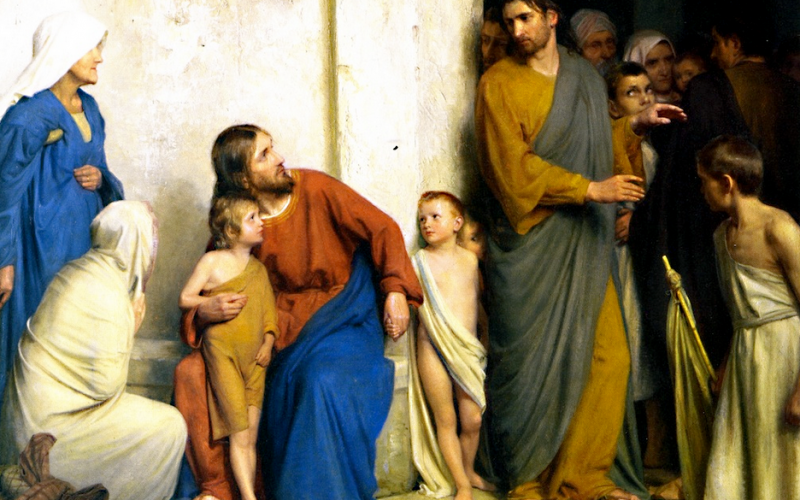 Editor’s note: The following comprises the fourth chapter, fourth part (D6), of The Gospel of Luke: An Exposition, by Charles R. Erdman (published 1936). All spelling in the original.
Editor’s note: The following comprises the fourth chapter, fourth part (D6), of The Gospel of Luke: An Exposition, by Charles R. Erdman (published 1936). All spelling in the original.
6. Jesus Rebuking Pride and Bigotry (9:46-50)
___________________________________________________
46 And there arose a reasoning among them, which of them was the greatest. 47 But when Jesus saw the reasoning of their heart, He took a little child, and set him by His side, 48 and said unto them, Whosoever shall receive this little child in my name receiveth me: and whosoever shall receive me receiveth Him that sent me: for he that is least among you all, the same is great. 49 And John answered and said, Master, we saw one casting out demons in thy name; and we forbade him, because he followeth not with us. 50 But Jesus said unto him, Forbid him not: for he that is not against you is for you.
___________________________________________________
This was no new dispute in which the followers of Jesus were engaged. The question was as to which of them should be the greatest in His Kingdom. There was something admirable in the discussion, for it revealed their faith. To them the Master was yet to be King of kings and Lord of lords, and they desired to have places nearest to His throne. Our conception of His Kingdom may be more correct, but if its glories were as real to us as they were to them, if we had faith enough to see this Kingdom in its real importance, we, too, might at times question what our relative places in this Kingdom are or will be.
However, Jesus rebuked them, for there is no place for pride among the followers of Christ. Our nearness to Him is not won by selfish effort or granted by arbitrary decree; it is conditioned upon the humble service we may render in His name. “He took a little child, and set him by His side;” not because a child is a picture of humility—most children are self-conscious and absurdly proud—but because the care of a child is a symbol of humble service, and it was this spirit which Jesus praised. To care for a child, or for men and women who like children are in need of our help and sympathy and support, if done for the sake of Christ and in the name of Christ, is a service rendered to the Master Himself and not only to Him but also to His Father. The willingness to undertake such humble service is the measure of true greatness.
The mention of service in the mind of the Master reminded John of a recent incident which he felt to be quite to his credit; so “John answered and said, Master, we saw one casting out demons in thy name; and we forbade him, because he followeth not with us.” There was something admirable in the spirit and action of John. He was so devoted to Christ that he wished everyone professing His name to join the company of disciples, to live and to labor and to suffer with them. There is always something admirable in loyalty to a denomination or a sect. If one has found what he believes to be the highest form of Christian life and service, if one feels that he is treading the surest and shortest road to heaven, it is certainly commendable in him to wish others to share his peculiar blessedness.
Jesus, however, rebuked him, and said, “Forbid him not: for he that is not against you is for you.” After all, there is no place for bigotry among the followers of Christ. We may love and admire our sect or society, but we are never to stop the work of a fellow Christian however much he may differ from us. There are only two questions to ask: First, is he casting out demons? That is to say, is he really accomplishing good? Second, is he doing the work in the name of a divine, crucified, risen Christ? If so, “Forbid him not.” We must not expect all Christians to repeat the same creed or to enjoy the same ritual or to accept the same polity or to employ the same methods of work. We should remember the word of the Master, “He that is not against you is for you.”
(Go back to previous chapter)
(Continue to next chapter)










[…] (Go back to previous chapter) (Continue to next chapter) […]